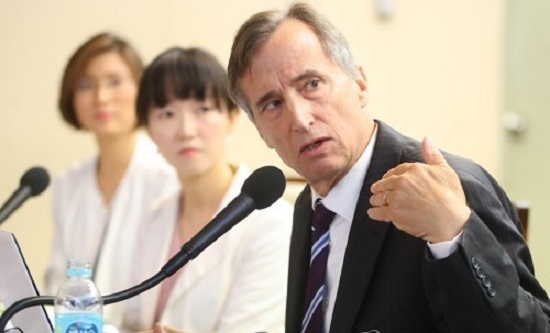‘Seoul should allow NK humanitarian aid without political calculus’
By Shin Hyon-heePublished : June 15, 2017 - 16:10
The Eugene Bell Foundation, which provides tuberculosis treatment to North Korea, on Thursday called for Seoul to allow humanitarian aid apart from political consideration.
South Korea has in recent years been reluctant to grant relief groups’ proposals for humanitarian assistance in the face of the North‘s relentless weapons development and provocations. The government’s attitude has posed a substantial obstacle to the foundation‘s efforts to save ailing patients, prompting it to mull moving its headquarters overseas, its founder and chairman Stephen Linton said.
South Korea has in recent years been reluctant to grant relief groups’ proposals for humanitarian assistance in the face of the North‘s relentless weapons development and provocations. The government’s attitude has posed a substantial obstacle to the foundation‘s efforts to save ailing patients, prompting it to mull moving its headquarters overseas, its founder and chairman Stephen Linton said.

“If the government continues to tie humanitarian aid with politics and North Korean provocations, then we have no choice but to discontinue the project -- at least in South Korea,” he said at a news conference in Seoul.
“We are even considering relocating our Seoul headquarters to another country, but our patients in North Korea prefer treatment supplies from South Korea over international organizations.
“It would be heartbreaking to end the tradition that has lasted for more than 20 years since 1995 under South Korea’s unjust regulations.”
With many North Koreans exposed to malnutrition, infectious diseases and adverse living conditions, civic groups at home and abroad have been carrying out relief programs.
They are required to obtain the Unification Ministry’s approval to visit the North or communicate with its nationals. Amid a flare-up in tension last year, Eugene Bell was the only entity to have managed to secure the ministry‘s endorsement, thanks chiefly to its nature as an international organization.
Established in 1995, the organization launched a specialized medical program to combat multidrug-resistant tuberculosis in 2007 upon the request of North Korea. It has recently returned from a three-week visit to assist its 12 tuberculosis centers scattered around the reclusive state, including Pyongyang and Kaesong.
Linton suggested the Moon administration transform the current one-off approval system into a more institutionalized one under which it grants relief groups licenses and keeps tabs on aid supplies on a regular basis.
“If the organization is not involved in any wrongdoing in North Korea and presents South Korea in a positive light, then the visitation rights to the North should be granted more flexibly,” he said.
“If we continue to sit and wait for a better world to come, these people will all die -- why can’t we send them to treatment centers because of political interests?”
He also took issue about the government’s demand for sensitive information after visits to the North, which could erode the organization‘s hard-won trust with Pyongyang authorities.
“The South Korean government also asks us to submit private reports on our businesses and patients, but we have no legal authority over such documents -- the reports belong to the North Korean health ministry and the patients themselves,” Linton added.
In response, Seoul‘s Unification Ministry reiterated its stance that it will pursue humanitarian assistance in a way that does not breach any international sanctions against the North.
”Our position remains unchanged that the current severance in inter-Korean relations is not desirable in ensuring stability on the peninsula, so that we will continue approving civilian exchanges within the extent that does not damage the sanctions framework,” deputy ministry spokesperson Lee Yoo-jin said at a regular news briefing on Friday.
By Jung Min-kyung (mkjung@heraldcorp.com)


















![[Today’s K-pop] Treasure to publish magazine for debut anniversary](http://res.heraldm.com/phpwas/restmb_idxmake.php?idx=642&simg=/content/image/2024/07/26/20240726050551_0.jpg&u=)